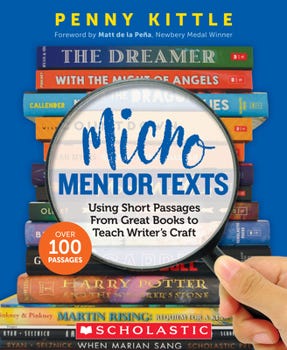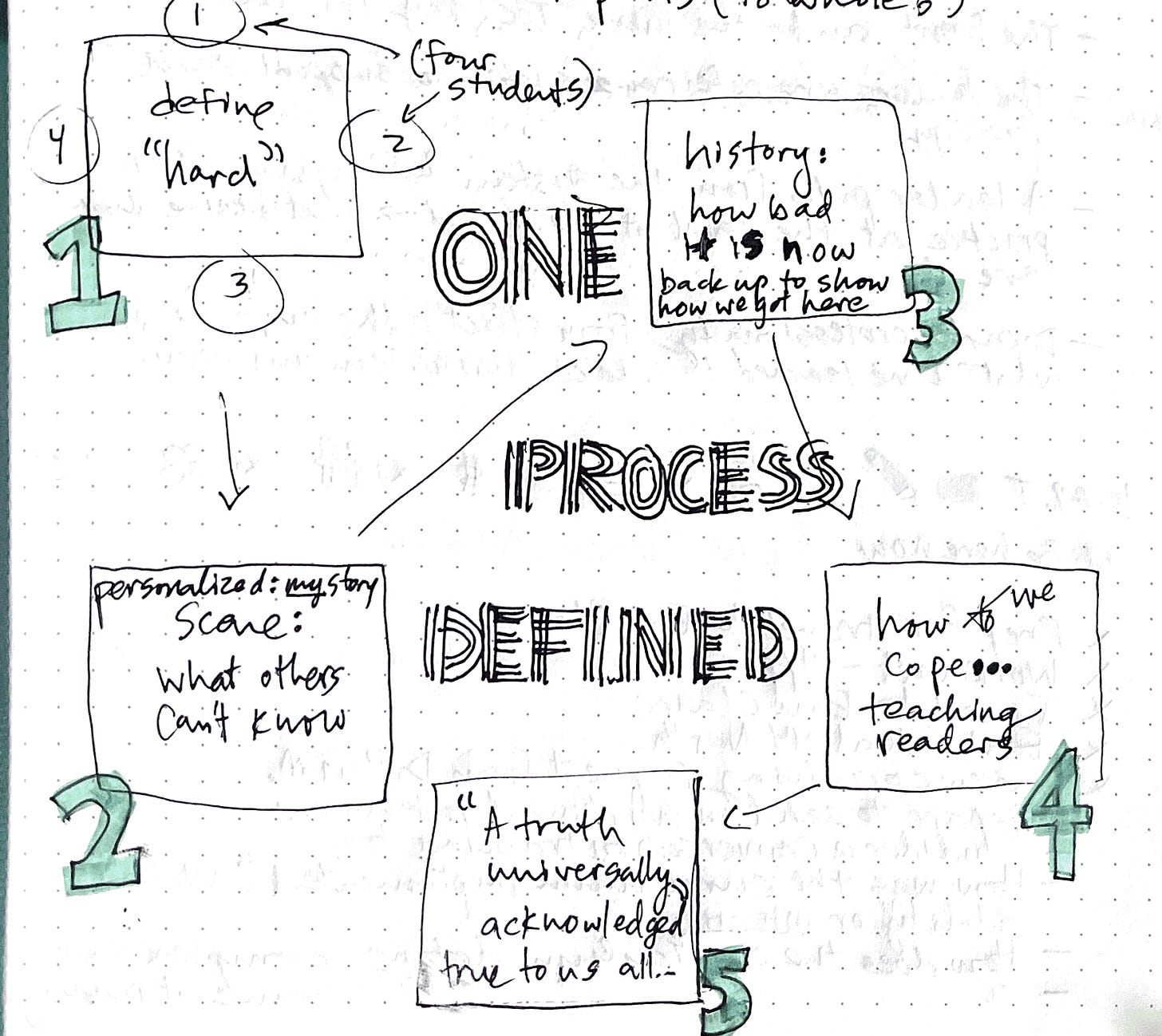Exploring Micro Mentor Texts with Penny Kittle
Professional learning summary
“We are teaching a process, not a product.”
I was pleased to hear this quote from Penny Kittle during her workshop on "micro mentor texts."
Too often, the writing process is presented to students as a set method: if you do A, B, and C, then D will be the expected outcome. However, anyone who has engaged in "writing for real," as Matt de la Peña explains in the foreword to Penny’s book (affiliate link), knows that this process is anything but linear. Revision alone is a circuitous and unpredictable experience.
Penny demonstrated how micro mentor texts—“teaching big ideas in writing from small texts”—support educators to teach effective writing techniques and empower students as writers without all the formulas.
Next are three key quotes and lessons I captured from Penny’s excellent workshop.
“Rigidity and formula belie the reason any of us write. We write because we have something to say that matters to us.”
Schools often prioritize uniformity and rigid formats in writing to improve test scores. Yet this approach stifles student creativity and engagement.
To counter this rigidity, Penny recommended getting kids to write every day in journals. The purpose of journaling is to give writers an opportunity to have voice and choice in what to write. They also get an opportunity to practice the craft without worrying about being correct or judged.
“A notebook is for practice. Write the first thing that comes to mind. This builds confidence. I show them that their writing, what they say, matters.”
Often, her students are presented with a text to respond to, similar to Linda Rief’s quick writes.
Penny’s approach to accountability in these journals is simple:
a) do a quick scan to ensure they actually wrote, and
b) respond to a piece of writing that a student wants her to read.
This way, students' first audience is an expert who can effectively support their work.
“We teach from our beliefs.”
I don’t know if I’ve heard anything more true in education.
One of the most prevailing beliefs that teachers hold is that they are not writers. Many teachers won’t write in front of or with their students. But how can a teacher inspire students to identify as writers if they do not hold this belief about themselves?
Using short passages from excellent texts can be low-entry points for unsure teachers to demonstrate craft moves for their students. Teachers can lean on these models when developing skills like descriptive language, narrative voice, or persuasive structure with students.
Penny encouraged teachers to use the following process when getting started:
Study a passage.
Write their own version inspired by it.
Model this process for students.
It takes a little more time in preparation but can give teachers the confidence they need to be writers in front of their students. Asking students to practice writing in small doses can also help address their feelings of being overwhelmed.
Additionally, teachers can reframe their lack of confidence and belief in themselves as writers as an opportunity to be vulnerable with their students. Be a learner alongside them. As Penny notes:
“It’s not helpful to show your finished pieces. It’s too far for them. Modeling your process is way more powerful. You write whatever they write.”
“Teach from whole to part.”
Coming into this workshop, I wondered how a teacher ensures that micro mentor texts don’t devolve into a series of disparate mini-lessons. How do students engage in the entire writing process? Plus, will students see the connection between reading and writing?
Penny recommended that teachers model for students how to gather passages from their readings that exemplify specific writing skills. This can be a shared demonstration, such as from a read-aloud where everyone has access to the text. Then, students can be released to engage in this activity during independent reading.
This can lead to powerful discussions, analyzing why a particular passage is effective and how students can emulate similar techniques in their writing.
Penny reinforced the importance of consistent reading-writing practice with her students. For example, she recommends that students dedicate at least two hours per week to reading, both in and outside of class, to deepen their engagement and skills.
Once students are adept at collecting their own micro mentor texts from their reading, they analyze whole pieces to unlock the processes writers used to create the articles or essays the class reads.
Below is one process Penny discovered with her students from a mentor text.
Embedded in this process is an activity where students get into groups of four to define the key theme from the text (see #1). Penny pointed out that writers often collaborate with other writers to improve their craft.
Now students have a tool they can come back to again and again when writing their own pieces. It’s not a formula; this process will not work for all genres, modes, or contexts. Instead, it builds their capacity to read like a writer and understand what other writers do to engage readers.
Conclusion: Key Goals for Writers
Penny summarized the key goals she keeps in mind when preparing literacy instruction:
Increase joy, interest, and volume in writing.
Develop complexity and critical thinking.
Foster an allegiance to authors and genres.
She also pointed out the big vision for this work: as students study these small texts, they not only improve their writing but also deepen their understanding as readers. This dual engagement cultivates a well-rounded literacy skill set.
Three Ways to Try This Out:
Ask yourself, “What micro mentor text could you bring into your classroom next week, and what writing skill could it help teach?”
Start a collection of powerful passages and experiment with teaching a small writing skill using a micro mentor text.
Practice with short texts first on your own, then with your students. The initial goal is to generate positive experiences with writing and reading. Beliefs will follow.
“You will open a window into how reading and writing are intimately connected, both in teaching and in learning.” — Penny Kittle
Related Resources
Last month, I offered three premium resources to all subscribers:
All three of these resources can support the implementation of effective literacy instruction, such as micro mentor texts, schoolwide.
Become a paid subscriber today to access future literacy leadership resources like these.


